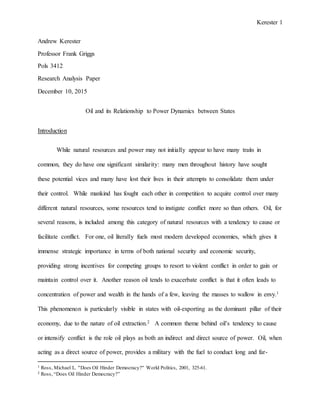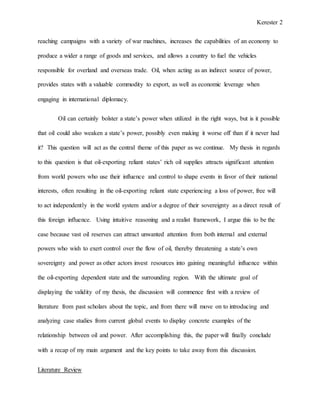This document provides a literature review and introduction for a research paper about how oil affects the power dynamics between states. It summarizes two sources that discuss how oil reserves can attract foreign military intervention during civil wars, as well as influence and shape the outcomes of conflicts. The document introduces the thesis that vast oil reserves can weaken states' power and sovereignty by attracting unwanted attention and influence from internal and external actors seeking to control the oil.




![Kerester 5
that, “Essentially the United States fought the Gulf War in 1990-91 over oil.”9 He elaborates
further on this point, suggesting that the US came to Kuwait’s defense because Iraq presented a
direct threat to Kuwaiti and Saudi oil fields10, rather than because Iraq’s attempted annexation of
Kuwait broke international law. In this case, oil acted as a key factor in the outcome of Iraq’s
invasion of Kuwait, essentially providing a “magnet” which attracted the attention of world
powers like the United States who harbored fears of the invasion’s implications for the global oil
market. Noreng asserts that, “The [Gulf] crisis concerned the oil supply pattern from the Middle
East and the oil price, as well as the regional balance of power.”11 This assertion holds particular
importance in our discussion because it implies a distinction in the motive for the US’s
intervention, suggesting that the US’s response would have been different, and likely less urgent,
if the countries involved had not been oil-rich and the only issue was that Iraq broke international
law by annexing territory of a sovereign nation. However, since both Iraq and Kuwait, and the
potentially threatened Saudi Arabia, are oil-rich (and reliant on oil-exportation), the US and other
major powers could not ignore the threat Iraq posed to a major source of their oil: “For the
United States, the UK and France, control of oil abroad has been and remains an important
foreign policy objective. The economic foundation of the British presence in the Gulf region
was the oil investment, which also motivated the military presence. Likewise, the current US
military presence in the Gulf is motivated by oil.”12 The presence of oil in the Middle East
attracts the presence of significant military forces, sent by world powers like the US, with the
goal of maintaining the flow of oil, and these forces will turn on any country in the region that
foolishly tries to, directly or indirectly, interrupt the stability of this flow of oil. As a result,
9 Noreng, Oystein. "Crude Power: Politics and the Oil Market." Choice Reviews Online 41.01 (2003): n. pag. Web.
10 Noreng, “Crude Power: Politics and the Oil Market.”
11 Noreng, “Crude Power: Politics and the Oil Market.”
12 Noreng, “Crude Power: Politics and the Oil Market.”](https://image.slidesharecdn.com/dca73391-02c1-439a-9fc3-9911b54c0e67-160221231516/85/Pols-3412-Research-Paper-5-320.jpg)






